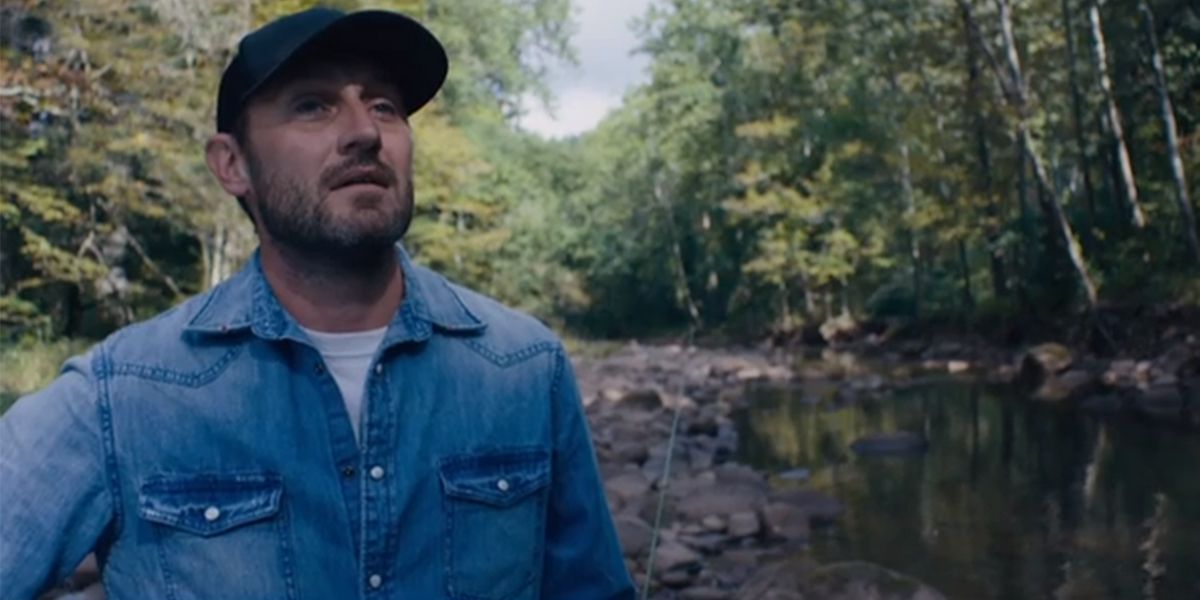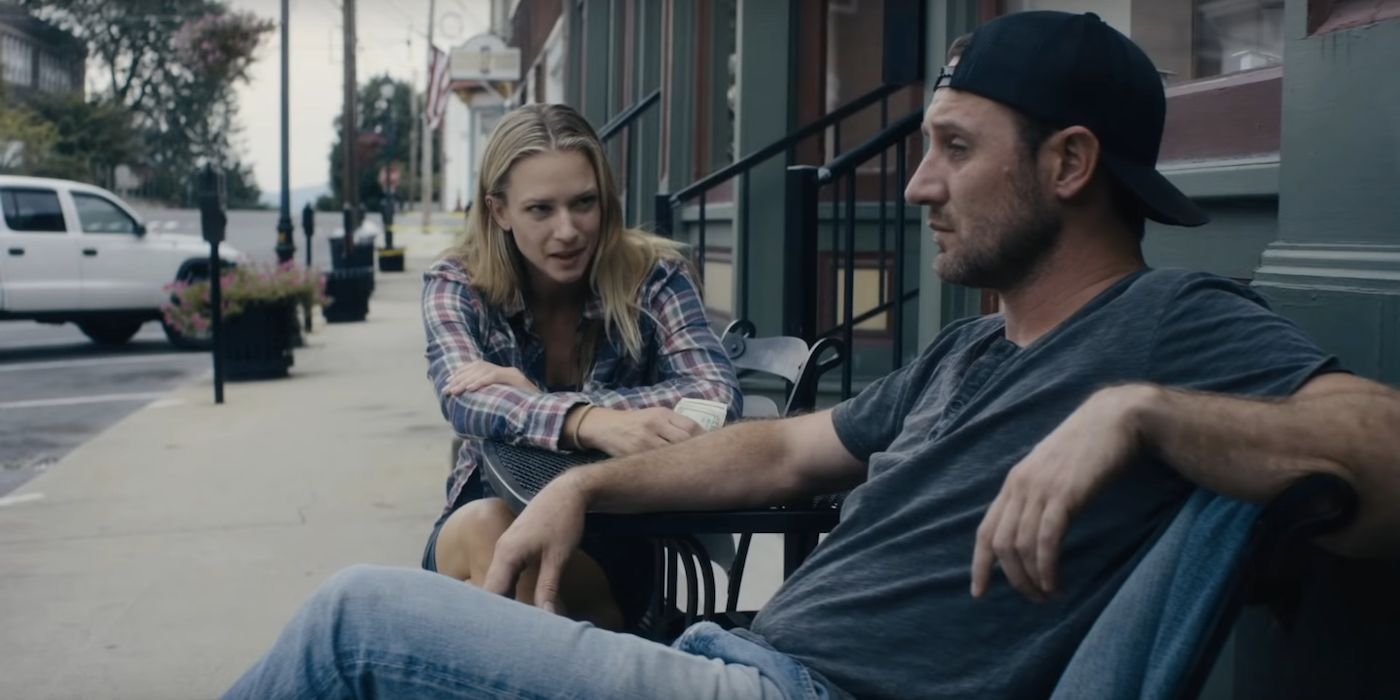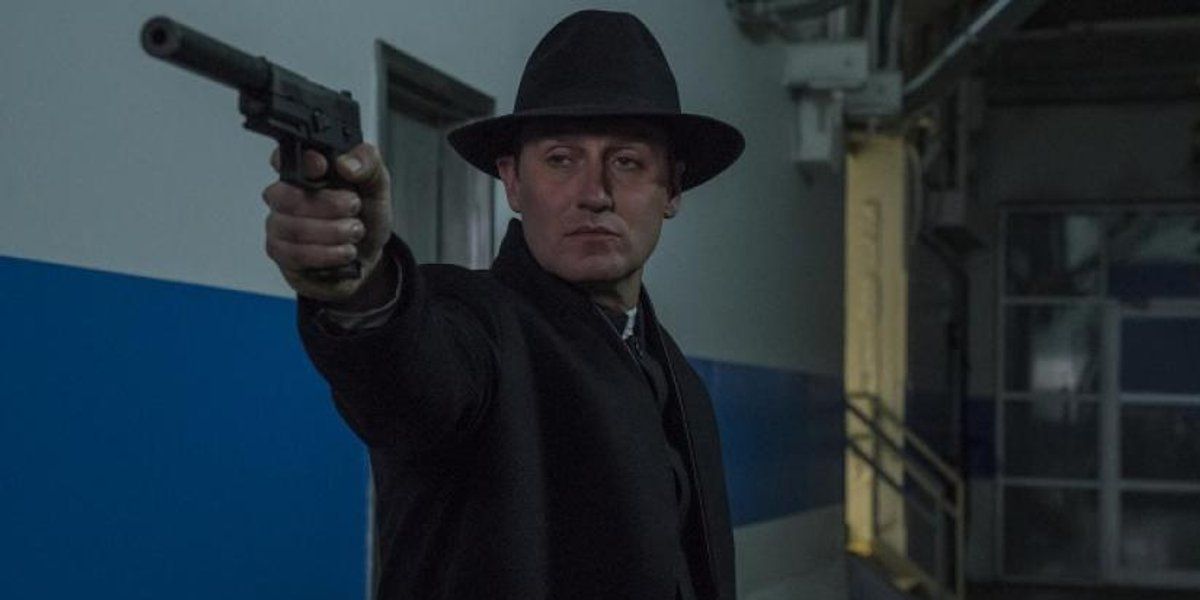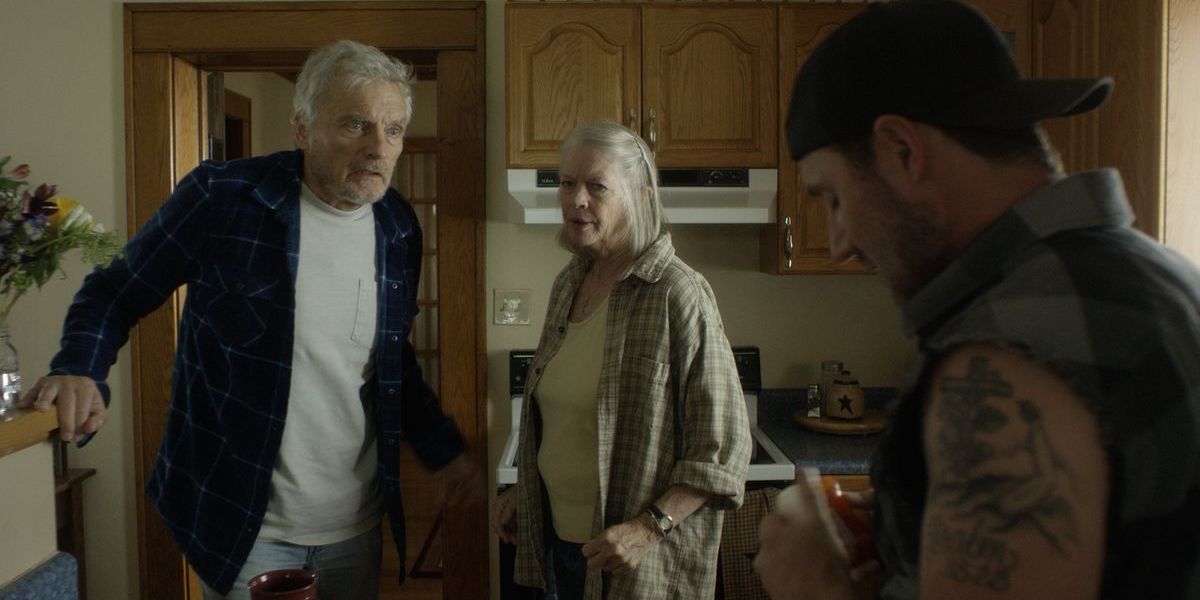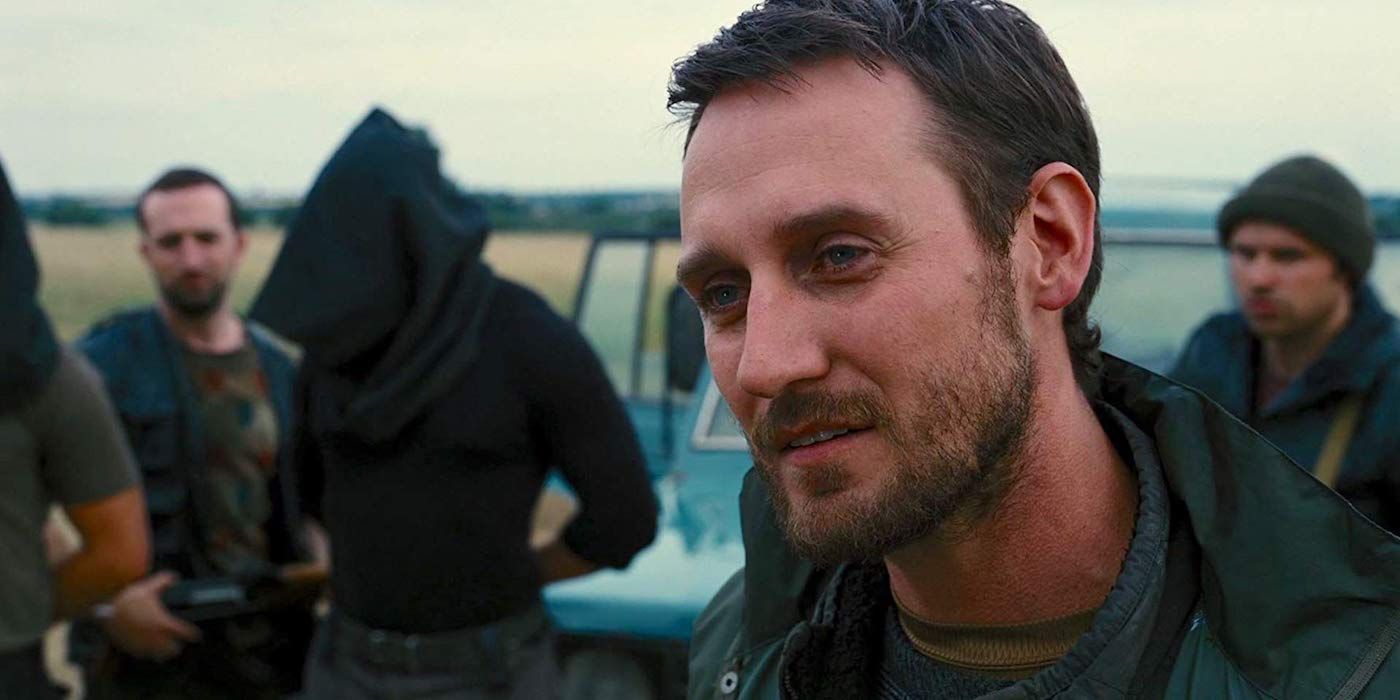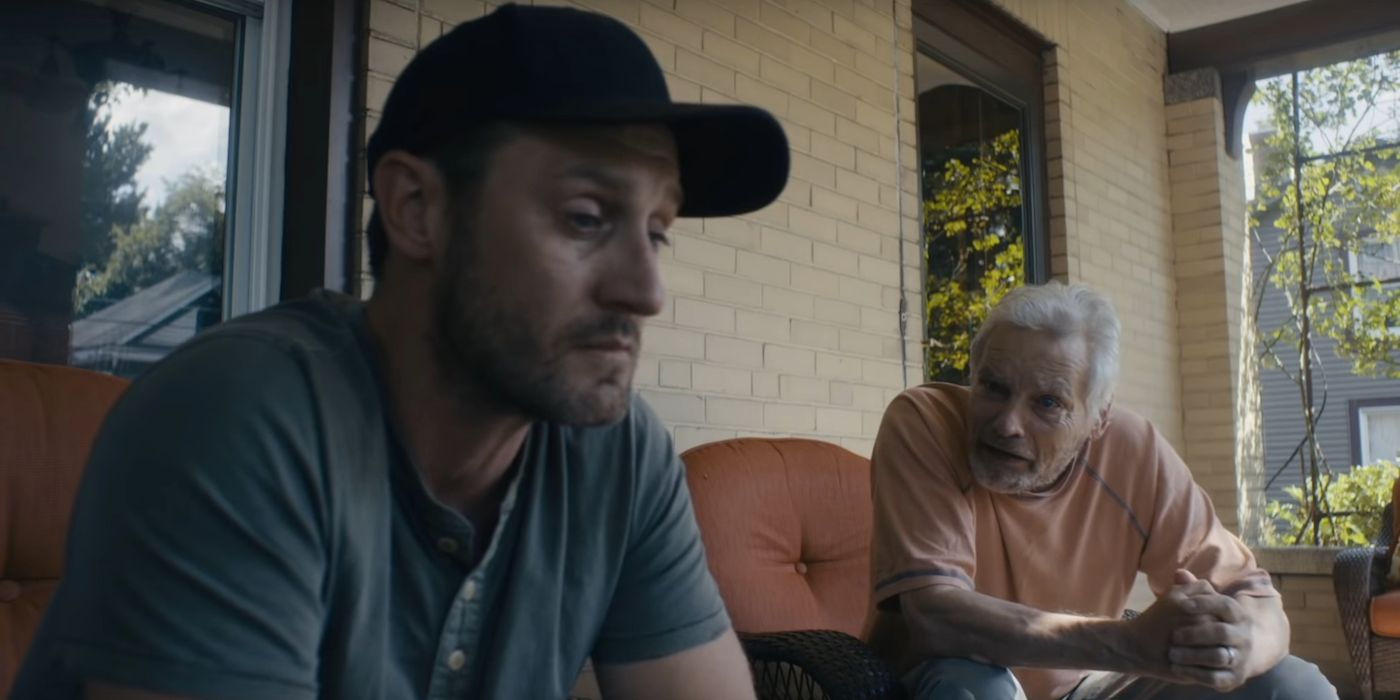Audiences may know Josh Stewart for his role in the cult horror series, The Collector, or his scene-stealing turn as John Pilgrim in season 2 of The Punisher, in which he goes toe-to-toe with Jon Bernthal's Frank Castle in some of the most visceral fight scenes ever seen in the MCU. However, he's recently begun to make a name for himself as an auteur filmmaker. His first feature as a writer/director/star, The Hunted, earned praise for its sincere mix of horror and character back in 2013, and now Stewart is back for his second film, the introspective West Virginia drama, Back Fork.
In Back Fork, Josh Stewart plays Waylon, a man struggling with the immeasurable grief of his daughter's death. His marriage is falling apart and he's unable to articulate his feelings thanks to an old-timey, cult-like adherence to his own masculinity. His blue-collar job as a manual laborer in the logging industry – and all the physical stress and back pain that comes with it – leads to easy access to pain medication, which leads to a severe addiction.
As much as it's a story about a man's struggle with drug addiction, Back Fork is also about any man's struggle with themselves and the people around him. It's about the toxic masculinity that prevents "tough guys" from communicating their feelings with the people around them, even when that seemingly simple act of genuine communication is all that stands between life and death. It's about how that broken, archaic thinking is passed down from father to son, and the tremendous strength of heart that's required to break the cycle and make things better, to move forward, rather than just standing in place.
While promoting his film, Josh Stewart spoke to Screen Rant about the themes of Back Fork, the beauty of his home state of West Virginia, and the pressures that come with writing, directing, and starring in a film. During the nearly forty-minute phone interview, we discussed drug addiction and why he felt the need to tell an honest story about how small towns in rural areas have been utterly devastated by this corporate-sponsored epidemic. He dissects complex characters and individual scenes, and shares how working with Christopher Nolan on movies like The Dark Knight Rises and Interstellar influenced his approach to delegating responsibility on his own films.
Let's talk about Back Fork. This is your second film as a writer/director. To many, you're best known as an actor. When did you decide to start writing your own parts?
You know, it's really tough to say. I've always written short stories. I consider myself more of a writer than anything. I know my credits don't back that up, but I think, if you're a storyteller, it's based from a writing standpoint, know what I mean? The two films that I have made have been really personal to me for lots of different reasons. It seemed natural that I would act in them, as well.
You said they're both very personal, but they're also very different. Back Fork is not a found-footage horror movie, but it still has that same visceral energy as The Hunted. Both movies were shot and are set in West Virginia, your home state.
My taste in film and my taste in characters to play are definitely more in line with what you see in Back Fork. That's always been my first and true love. With The Hunted, that was a story that me and my roommate in college sort of experienced. From that standpoint, it was equally as true and told from a truthful place. They're similar in that way, but, like I said, what Back Fork is, tonally, in terms of character and everything, that's more of my statement. Growing up in West Virginia, I think, in a lot of ways, those people back there are forgotten people. And I think that's the case for a lot of small towns and small communities across America. There's an amazing group of artists back that way, artisans, craft makers, musicians, and everything. That well is deep. And, just cinematically speaking, West Virginia is one of the most beautiful places in the world. Between the mountains and the rivers and the landscapes, it's breathtaking. From a cinematic standpoint, it's really not been touched. It's just not something where Hollywood is flocking to West Virginia to make movies, which is all fine and great for me, because I can go back there and make my movies. There's not a building in downtown Los Angeles that hasn't been in a thousand movies.
In Back Fork, you get so much mileage out of West Virginia, as much in scenes of endless mountains as in scenes of a house with green grass around it or a pristine main street, which is just as picturesque, in its way.
Right. You know, look, I think it's what most of the world can relate to in so many different ways. Even if you look at the populations of cities, a lot of that population is made up of people who've come from these types of places. From that standpoint, it's something that I know is relatable when I'm traveling, literally, around the world, working as an actor. It's a common place you can find within anyone.
Shooting in movies in West Virginia, is it like returning home and sharing what you learned in New York and Hollywood, or is it like bringing those people home and saying, "This is who I am?"
I think they're kind of one and the same. Writing stories about what I know, about the people I know, inherently, it's me. If you're effective enough as a storyteller, you're gonna bring people in and show them something they didn't realize. I think they kind of go hand-in-hand. I set out to try to tell a true story about real people with real issues that are happening. If that sucks people in, then great! I think, if you're working from the outside in, to me, you just run into the danger of being superficial or glossing over what it is. You know, I don't care if it's The Punisher, or Back Fork, or The Hunted, or Batman, if the characters are real and they're told in a truthful way, then the people are along for the ride. If you don't have someone you care about in that world, then it really doesn't matter. The way I approach anything, from acting to writing to directing, I do it from the inside out. You hope that you do it properly and truthfully, and that the people will be come along for the ride.
The internet tells me you did theater in West Virginia before you moved to New York City. You said you're a storyteller, an artist. When you interact with other storyteller, do you find camaraderie on that level, or is there a different energy when you're working with artists from West Virginia in particular?
I think it's different no matter where you're at. I think true artists, no matter what they are... The only thing that separates us from everybody else is our voice and our perspective. Inherently, I think, everybody is going to bring something different to the table. And, of course, somebody who was born and raised in The Bronx who is an actor, or was born and raised in Los Angeles, or Russia, or wherever, that's going to help to form your instincts and who you are as a person. To me, that's what directs us into this world in which we're creating. There is a common place there, but I think, really, the only thing we have as artists is our guts, our instincts. That's the only thing that separates me as an actor or a writer or director from everyone else. It does influence, where you come from, but I think we all speak a common language. The thing, to me, that makes artists interesting, is unpredictability. That surprise of which way they take something, the direction they go. Or the way they approach a character from an acting standpoint. I think that common language is being able to listen and take it in, especially from an acting standpoint. For anybody that's consuming art, or playing off of someone else's art, if you're not listening or responding, then it's not true, know what I mean?
I think there's a lot of that in Back Fork. It's very central to West Virginia, but the themes and content are more and more universal across the United States and the world. The elephant in the room is opiate addiction, which has quickly become a national epidemic. Did you set out to write a story about grief and addiction, or did you set out to write a story about West Virginia, and did that just naturally, unfortunately, become part of it?
I don't know that I necessarily set out to tell one or the other. In this story, there is grief. There is loss. There is love. And there is addiction. It's a melding of all those things. Again, I just go back to trying to create truthful, honest characters. Being from West Virginia, and seeing what's happened there, and certainly what's going on all around the country, that backdrop of the opioid epidemic, was just sort of the perfect place to set this world of grief and loss and redemption.
I had a Vicodin prescription for a couple of months in my past, and I was recently in the hospital getting tons of morphine and Percocet, but I've been extremely lucky that I never had any withdrawal or addiction or anything like that, but I think it came down to luck that it didn't get its hooks in me. There's just no rhyme or reason as to whether you're prone to addiction.
You just didn't have the gene, man, you know what I mean? That's the biggest thing. From my personal perspective, of growing up back that way, there's a lot of manual labor in West Virginia: coal miners, loggers, hard-working people who are given this thing. And you know as well as I do, if you go to a doctor, the doctor will say, "This is what's wrong with you, this is what you need to do," most people are going to do it.
Yeah, and in places where everyone does these jobs that bust their backs, bust their knees... Sooner or later, everyone's gonna find out whether or not they've got a predisposition towards addiction in their bones.
Look, man, over my lifetime of sports, I've had five surgeries on ankles and knees and shoulders; there's always a steady flow of that if you so choose. I'm not one to get political about things, but I don't think it's a coincidence that these small communities are targeted by big pharmaceutical companies. We're seeing that Purdue, one of the manufacturers of OxyContin, is being sued by and having to pay the people in these communities large sums of money. There's only one way for these pills to get out there. I mean, you have to have a prescription for them. Someone has to have a prescription for them, or someone who has them available to them, or who can write a prescription.
Absolutely.
The doctor's not prescribing you cocaine for your problem. They're certainly not prescribing you a bag of crack, or heroin. If you want that, you go to the person you want to get that from. There's definitely a lot of grey area there, and a lot of blurred lines. I think a lot of people made a lot of money.
Something in Back Fork that struck me is how openly the characters discuss drugs. It's not like it's something where they go whisper in a corner; they're just walking down the street talking about, "Hey, you know you can buy a prescription for a few grand." There's no secret.
That's the crazy thing. There's nothing in this script that I've not either witnessed or heard stories about. It's absolutely true. For money; you can just pay someone to give you a prescription that's worth triple that on the street. Someone can feed their own addiction and make money to continue the cycle. These pills come from a pharmacy. The only way to get into the pharmacy to get them is to have a prescription for them. That's the root of it. It's less taboo, I guess, because it is coming from a doctor in some capacity. It's talked about, it's discussed. The only time it's not discussed is if you're walking into a bar and you're buying it from someone who does have a prescription. Then it takes on the life of any other sort of drug deal, or however you want to phrase it.
Speaking about drug dealers, I want to talk about Wade Williams (Prison Break). I kind of need confirmation on this; he's a nice guy, right?
Oh, he's the best.
Okay! Phew! I was mostly kidding, but he's so convincing, I just had to make sure. He is horrible in this! In a good way, though.
As actors, when you are presented something, and Wade is the perfect example of this, I was taught that a show, a movie, a play, is a puzzle. There's 500 pieces to the puzzle, and those pieces are actors, crew, everybody who is involved. And you have to understand the picture. You have to understand the big picture of it so you can put the puzzle together. Then you can understand how your piece fits. That means, sometimes, actors or whoever, you have to play the bad guy, or you have to do this or that. You've got to play that piece. You can't manipulate the piece, or it's not going to fit into the rest of the puzzle. Wade understood what it was. He understood each piece of it. He didn't try to turn his character into a nice guy. But the thing he did which was brilliant was, he developed these feelings. His character actually cares for the girl. Granted, he went about it the wrong way, how they got into their situation, but he played that truthfully. He brought a level of truth to it where that evil came from somewhere, but then had somewhere to go. That's what made it so interesting.
You're the writer, you're the director, you're the star. That's a triple threat, that's triple the responsibility. You're the person who, like you said, has to see the whole picture and relay that picture to everybody to make sure everything's going straight. And this is only your second movie, but it looks like you've been doing it forever. Can you talk a little about the responsibility that gets put on your shoulders?
To be honest with you, whether it's writing, directing, or acting, they base everything they do on the script. So, you have to have an understanding of what the story is on an intimate level. Writing the material, I have fleshed out every character. I have fleshed out the world. I have fleshed out the story. I've done it from every angle in the process of writing. When it comes time to act it, my homework is already done. That's what I do when I'm acting in something; I flesh it out completely. What's the story? What's the ins and outs of the story? Who's my character? How does he fit into the world? If I'm writing that, I've already done all that work. When the time comes to step in front of the camera and act, the work is already done. To a certain degree, from a directing standpoint, the work is done, as well, because I'm so intimately knowledgeable about the world, the characters, and the story. At that point, it's just communicating to my DP, to the producers, to the production designers, to costumes, to everybody. It's just having a conversation about what I've already worked out.
That pre-production process seems really important!
The biggest thing I've learned over the years is, the more prepared you are, and the more clear you are about what you want with regards to the story from a directing standpoint, the easier it is to hire the right people that have bought into that. Then, you can just let them do their job. If I'm directing and I'm wishy-washy, and I don't know what it is that I want or I don't have a full understanding of it, that leaves room for questions from every angle. You know, and that goes back to the writing. It's something that I know on an intimate level, so I can communicate it in a clear and concise way. The biggest thing I learned from Chris Nolan, working with that guy a few times, the dude knows what he wants. He can communicate that in such a clear and concise way to everybody. Then, he can hire the right person and just let them do their job. He doesn't have to worry about it "on the day." You know, when you're filming, there are five million fires that need to be put out on a daily basis, I don't care if you have two hundred and fifty thousand dollars or two hundred and fifty million dollars to make your movie. But if you've hired the right people, and they know what it is you want, you can just let them do their job. You're there to give them a little nudge here and there, but we're not trying to build it from scratch on the day.
You macro manage so you don't have to micro manage.
That's absolutely right. It's like acting, man. If I know who my character is and I know the scene, when I show up and I'm ready to act, then I just have to listen and bounce off of the other actors. The set is open and ready to play. It's no different from a directing standpoint. You know what you want, you know what's needed. Then you communicate that, and by the time you show up to do it, you can just turn the cameras on and play.
There's a profound scene near the end where your character's dad all but breaks down trying to get your character to get the help he so desperately needs. He's a very old-timey macho guy, and it's the closest that kind of person can get to begging. It moved me to tears. I think it's pretty universal, that idea of it being just so difficult to talk to your dad about some things. Did you draw on your relationship with your own family while writing those scenes between Waylon and Bill?
I don't know that it's... I don't know that I was specifically drawing from my own personal relationships, but again, just playing into, as you said, those universal truths. Especially growing up in those types of places, men are providers and protectors. When you have that, I think talking about your feelings and those types of things, it's just not something that really happens. I think the whole world would be better off, certainly families would be better off, if people could just talk before it got to the point of being so dire. Communication would be better if we talked about our feelings, if we understood that it's alright to have those feelings and it's alright to talk about those feelings. It wouldn't be so bad if we ended up in that place. Maybe, a lot of times, we would avoid those situations altogether.
Yeah, like, Waylon's dad, in the whole first two-thirds of the movie, is just kind of going, "Ah, don't worry about it, everything will be fine, don't worry about anything."
Right. That dynamic, where I'm from, is true. The mother is the head of the house in a lot of ways. The father is the provider and protector, but the mother runs the show. They're the ones who are doing everything, who delegate, who decide what needs to be dealt with, who says, "You need to go out there and speak to him. You need to tell him it's okay and he can stay here." In the story, the father is thinking all these things. But he just assumes, "of course he knows that!" Early on, when the mother sends him out there, what does he do? He talks about the stock truck bringing the trout. He talks about anything other than what needs to be talked about. And he waits for his out and sees his daughter coming and goes, "oh, okay, well, you can stay here if you want to, I'm gonna go see if supper's ready." All of that, from a writing standpoint, I wanted to set it up early so it meant something when he sits down and says, "Listen, I'm no good at talking. I never have been. But you can be better than me."
That's such a beautiful scene.
I'm a father. I have two little kids. A lot of that was based on, or came from, that dynamic, of what I want to be for them. It's easy to play into the stereotypes of masculinity. It's natural, easy, when we're uncomfortable, or in situations we don't really know, to just bring all that with you. It's your armor, it's your protection.
It's fight or flight, puffing out your chest and going, "Everything's fine."
Right right right! I think that's sort of the natural thing that happens. So, to me, it's got to be alright for that to happen, but it also has to be alright for the other to happen, as well, to say, "I am the provider and the protector, but listen," I always tell my kids, "it's alright to be upset, it's alright to be hurt, and it's alright to cry." Those things are always okay. They're always fine and no one's going to think less of you for them. But we have to talk about these things. We have to know that it's alright. We have to know that, to be a man, you have to be a man. The other side of that is, if you have feelings, you don't need to push them down into some dark place where you're never going to hear from them again.
It must have been dream to get David Selby in that role. I mean, I used to watch a lot of Dark Shadows with my dad...
Yeah. David Selby is a West Virginia man!
Oh, he is?
Yup. We shot in the town he grew up in. He's from Morgantown, West Virginia. I had never met David before. And my producers were like, "what about David Selby," and I was like, that could be great. And we brought it up to Laray Mayfield, our casting director, who also cast The Punisher. She was like, "I love the idea, there's nobody better for this job." He just knocked it out of the park. I knew, too, a man from that region would completely 100% understand who that character is, where he's coming from, and when it gets to that point in the movie, where he's saying, "I'm no good at talking," he knows it. He understands it.
That scene really just ties the whole movie together. I feel like any change and it could have been too sappy or insincere, but it works completely. 100%.
We just kept the camera going. I play that whole scene from one side, with a soft foreground. It's all right there.
I'm glad you mentioned that. I had the press screener, and when that scene ended, I rewound it and then watched the whole scene again looking at you, because the first time I was looking at him and both of your faces are in the single, unbroken shot, and I just needed to watch it again. You just see an entire character arc, an epiphany you've been waiting for, you can see it on your face. It's so amazing.
Thank you, man. When we were there, shooting on the day, there was talk about doing coverage of me, and all this other stuff, and I was like, no, I don't want to do it. So we shot the other side, the same thing from the other side (to facilitate back-and-forth cuts) so we have it, but I'm not pushing in, I'm not covering in, we're not doing close-ups, we're not doing anything. We're going to capture both of them, and the whole show is right there, know what I mean?
The whole movie is fantastic, but that scene is a triumph, I truly believe that.
I appreciate that. To me, it's so indicative of everything, of the reason Waylon ended up with his wife. She says it: "You don't say anything, you don't tell me how you feel. You have nothing to say until you get angry and blow up." It's the only time people speak. The father knows that. He understands it. He knows where it's coming from. He understands that it was passed down to him and he's passed it down to his son. To me, that's the root of what it is. That's why he says, "You've got to be better than me." That's what you're supposed to do, you're supposed to be better than me. And he knows that he didn't have the tools to pass down to him, so now he's finally at the point where he just has to tell him.
That's it. That's a thesis. And I think we can all relate to that. It's a different kind of manual labor, but my dad was a New York City bus driver for 17 years. He'd come home every day sore and exhausted, totally worn out from the creaky suspension and busted shocks on those buses, and the deep potholes on the streets of the South Bronx, so there's definitely that blue collar sensibility, and his dad did it, too; in fact, he did it before there even were buses in New York City, he was a trolley operator!
That's right man, it's hard work.
And here I am, I don't even know how to drive!
(laughs) Let me tell you something. I just was in Canada with my fiancé, and she just finished working, so we moved her back to Los Angeles from Vancouver. We drove back. At the end of the six or eight hour drive, I couldn't move. I couldn't stand up, I couldn't move. My back felt broken. I can only imagine doing that every single day, day in and day out for eight to twelve hours a day. You had might as well be stacking lumber all day.
I think it wrecks you in a similar way.
Oh man, of course it does.
Back Fork is available now on Digital and On Demand.

